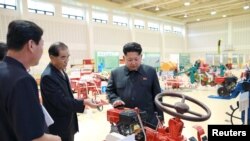Tensions on the Korean peninsula have been rising rapidly since North Korea’s alleged landmine attacks this month, which seriously maimed two South Korean soldiers near the demilitarized zone.
The worsening inter-Korean ties took another plunge Thursday when the two sides exchanged artillery fire along their western border.
The Mansfield Foundation’s president and CEO Frank Jannuzi told VOA News Wednesday the recent string of provocations by the North is not unprecedented. “I do look at some of this escalation as part of a rhythm on the Korean peninsula,” the longtime Korea-watcher said.
In previous years, North Korea launched a barrage of verbal attacks aimed at the annual combined military exercise between the United States and South Korea.
But Jannuzi said things could be more serious this year. "In addition to this harsh rhetoric that we see from the North, we may very well see some concrete steps in the months ahead," he said. He added such steps could include a nuclear test, which may take place within this year.
Many North Korea experts forecast Pyongyang to launch a long-range rocket to mark the 70th anniversary of the founding of its ruling Workers’ Party on October 10.
U.S. President Barack Obama and South Korean President Park Geun-hye will hold summit talks in Washington, five days after the North’s Workers’ Party anniversary. Janunuzi predicts the communist country will continue its provocative stance through the Washington summit.
Bruce Bennett, a senior analyst at the RAND Corporation, shared a bleaker outlook. “I think the key issue here is the potential for escalation. In trying to deter North Korea, the South Korean government is taking a very strong stance on how it will retaliate against future North Korean actions,” he explained.
“If North Korea does either accidentally or purposely take the actions, South Korea will be taking essentially an escalatory response,” Bennett said.
Bennett said that while the South Korean government responded to the North’s provocations in a measured manner, it has not been exercising perfect deterrence. He added that if the North makes an outlandish decision in foreign policy, as it has before, the situation could escalate rapidly.
Director of the International Affairs Group at CNA, Ken Gause agreed. “If North Korea has come to the conclusion that their diplomatic charm campaign is not going to work, they need to go on a different direction,” Gause said.
That different direction, he emphasized, is most likely a brinksmanship strategy.
Gause views the recent North Korean provocation as a means to gauge the South’s response. “My personal view is that the landmine explosions were used potentially to calibrate what a South Korean response would be to a violent action under covert circumstances,” he said.
Sue Mi Terry, senior research scholar at the Columbia University, does not view the belligerent rhetoric from the North this year as any more dangerous than its previous remarks around the annual Ulchi Freedom Guardian drills since 1976. “I think the recent rhetoric against the U.S. is just a typical blustering by North Korea,” she said.
The former Asia Director at the White House's National Security Council also expected tensions between the two Koreas to escalate even further.
Jee Abbey Lee contributed to this report, which was produced in collaboration with the VOA Korean service.




